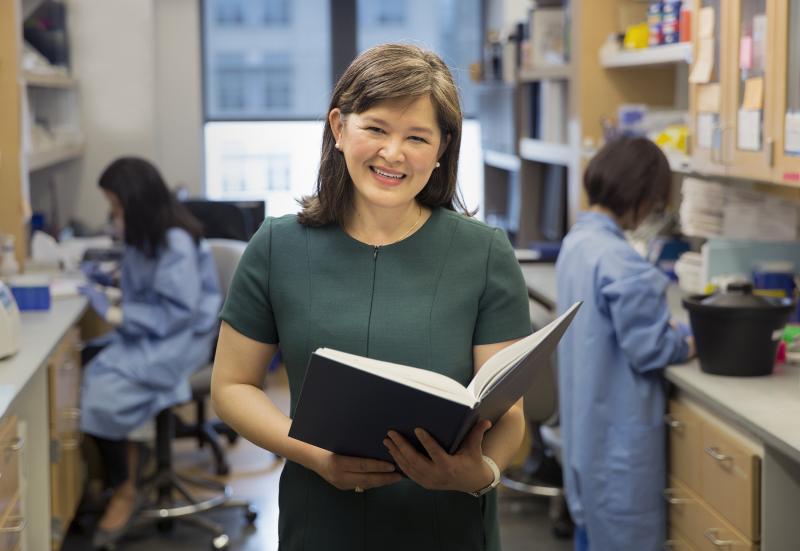
In the spring of 2017, the School of Medicine selected seven promising physician-scientists to receive the first round of Strong Start awards, funded by the Duke Endowment. The award includes $70,000 annually for three years, as well as mentorship from senior faculty and fellowship with the other awardees. Phuong Doan, MD, assistant professor of medicine (Hematologic Malignancies and Cellular Therapies), is one of the seven who received the inaugural Strong Start award.
Dr. Phuong Doan is not one of those physicians who always knew she wanted to do research. “I consider myself more of a late bloomer,” she says. “What shaped my decision to go into research is a combination of my interactions with patients and mentors--both accidental and intentional--that I met along the way.”
Chief among those was Dr. John Chute, now at UCLA, who does pioneering research on blood cell regeneration. Doan worked with him as a fellow at Duke, and that’s when she realized for sure what she wanted to do: take care of patients with blood cancers and do research to help come up with better therapies to do so.
Today, the Raleigh native finds fulfillment splitting her time between seeing patients and running a research lab. “In the clinical setting, I see our limitations in what we can offer our patients in terms of therapy,” she says. “It’s terrible having the conversation with the patient that we don’t have any other therapy that will work. Every time I finish a clinical week, I feel re-invigorated mentally to get back into the lab.”
Doan set up her own research program four years ago, with the support of Chute and her Division Chief Nelson Chao, MD, MBA. “He is also a physician-scientist so he recognizes the challenges,” she says. “He really does foster opportunities for me and other folks to make their way in the laboratory. He’s given me every opportunity to excel.”
In her lab, she studies how bone marrow repairs itself, both under normal conditions and in response to injury from chemotherapy, radiation therapy, or exposure to radiation from a nuclear accident or dirty bomb.
The Strong Start award has given Doan’s work a boost in several ways. “The award has provided me, first of all, with tremendous mentoring from Andy Alspaugh and Gow Arepally,” she says. “The second aspect is that the funds have allowed me to be thinking more high-risk/high-reward questions, and I’ve been able to pursue some additional work.”
She’s used some of the proceeds from Strong Start to purchase lab equipment and help pay for salaries. She speaks highly of her team, which includes Sadhna Piryani, post-doctoral associate Angel Y. F. Kam, and undergraduate student Hee Su Park. “I like to talk about the folks in my lab because they do drive a lot of my work,” she says.
Doan and her team are looking for growth factors that help bone marrow repair itself. Stem cells in bone marrow--hematopoietic stem cells--have an incredible regenerating capacity. “I try to figure out how to harness that for therapeutic purposes,” she says.
At low doses of radiation or chemotherapy, some of the cells in bone marrow die, but the remaining cells can repopulate the bone marrow on their own. But at higher doses, or in the event of a radiation disaster, it can be necessary to transplant hematopoietic stem cells back into the bone marrow. Sometimes, in the case of a cord blood transplant, for example, there are not enough cells to transplant effectively. In that case, certain growth factors can be used to stimulate the cells to grow more rapidly.
In looking for new growth factors, Doan is investigating how to leverage the power of endothelial cells. “In the past, endothelial cells were thought to be passive--they make up all your blood vessels,” she says. “But they’re not just passive tubes that carry blood--they continue to produce these growth factors. Endothelial cells have been shown to improve survival after lethal injury even without transplant of hematopoietic stem cells.”
In addition to the promise of new therapies for cancer treatment, her research could help improve response to a nuclear disaster or other widespread radiation exposure. Stem cell transplants for large numbers of affected people could be impractical or even impossible. But doses of growth factor given after a 24-hour-window following the exposure, but before blood counts fall or symptoms appear, might be able to help repair bone marrow and save lives without the need for transplants.
Doan also is attacking blood cancers from the other direction. In addition to looking for ways to stimulate the growth of “good” cells in bone marrow, she’s looking for ways to inhibit the growth of cancer stem cells. In this work, she has collaborated with a fellow Strong Start awardee, Christopher Holley, MD, PhD, assistant professor in medicine (Cardiology).
The fact that Strong Start not only provides resources to Doan and Holley but also sparked a productive collaboration between them speaks to the success of the program.
The brainchild of former School of Medicine Dean Nancy Andrews, Strong Start is intended to provide funding, guidance, and encouragement to physician-scientists who are launching research careers. It’s a critical transition because despite abundant talent and promise, many new researchers struggle to secure funding. Some even become discouraged and decide not to pursue research. Strong Start aims to “keep them in business,” says Andrew Alspaugh, MD, professor of medicine (Infectious Diseases), who administers the Strong Start program.
“Physicians have a unique perspective,” he says. “They bring a clinical relevance and perspective to their studies. Physician-scientists have led the way for many of the truly innovative biomedical advances. We want to keep them at the table and involved in the process.”
This story was written by Mary-Russell Roberson.